Reflection Essay on Clinical Practice in older adults
VerifiedAdded on 2023/06/07
|10
|2890
|260
AI Summary
This essay evaluates clinical practice by recognizing how to evaluate and provide care for an older person with impaired cognitive function (dementia). It discusses the stages of dementia, the pathophysiology of the disease, and the importance of early diagnosis. The author shares their experiences with a patient suffering from dementia and provides an action plan for future care.
Contribute Materials
Your contribution can guide someone’s learning journey. Share your
documents today.

Running Head: REFLECTION ESSAY 0
Reflection Essay
Clinical Practice in older adults
(student Details:)
9/11/2018
Reflection Essay
Clinical Practice in older adults
(student Details:)
9/11/2018
Secure Best Marks with AI Grader
Need help grading? Try our AI Grader for instant feedback on your assignments.
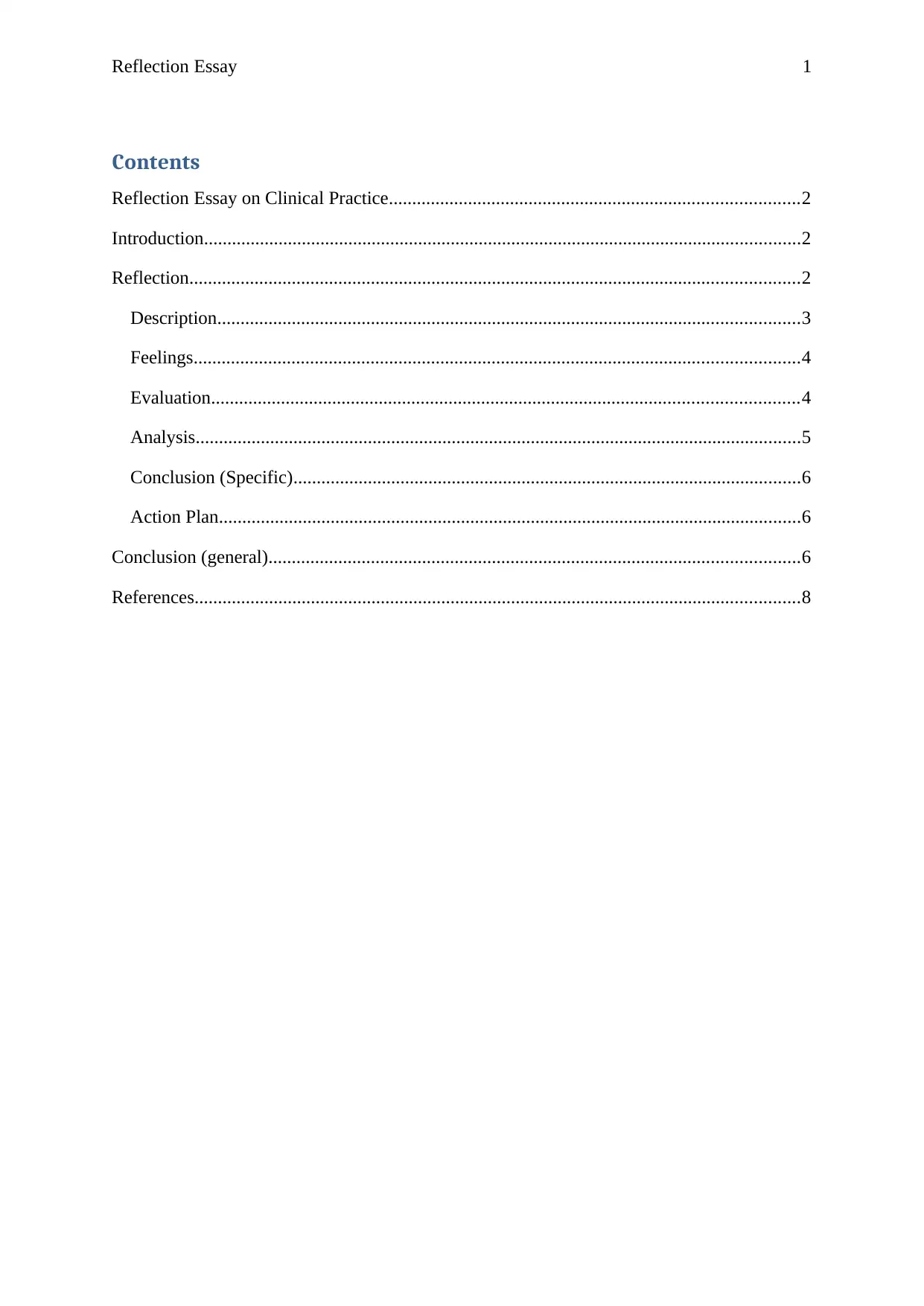
Reflection Essay 1
Contents
Reflection Essay on Clinical Practice........................................................................................2
Introduction................................................................................................................................2
Reflection...................................................................................................................................2
Description.............................................................................................................................3
Feelings..................................................................................................................................4
Evaluation..............................................................................................................................4
Analysis..................................................................................................................................5
Conclusion (Specific).............................................................................................................6
Action Plan.............................................................................................................................6
Conclusion (general)..................................................................................................................6
References..................................................................................................................................8
Contents
Reflection Essay on Clinical Practice........................................................................................2
Introduction................................................................................................................................2
Reflection...................................................................................................................................2
Description.............................................................................................................................3
Feelings..................................................................................................................................4
Evaluation..............................................................................................................................4
Analysis..................................................................................................................................5
Conclusion (Specific).............................................................................................................6
Action Plan.............................................................................................................................6
Conclusion (general)..................................................................................................................6
References..................................................................................................................................8
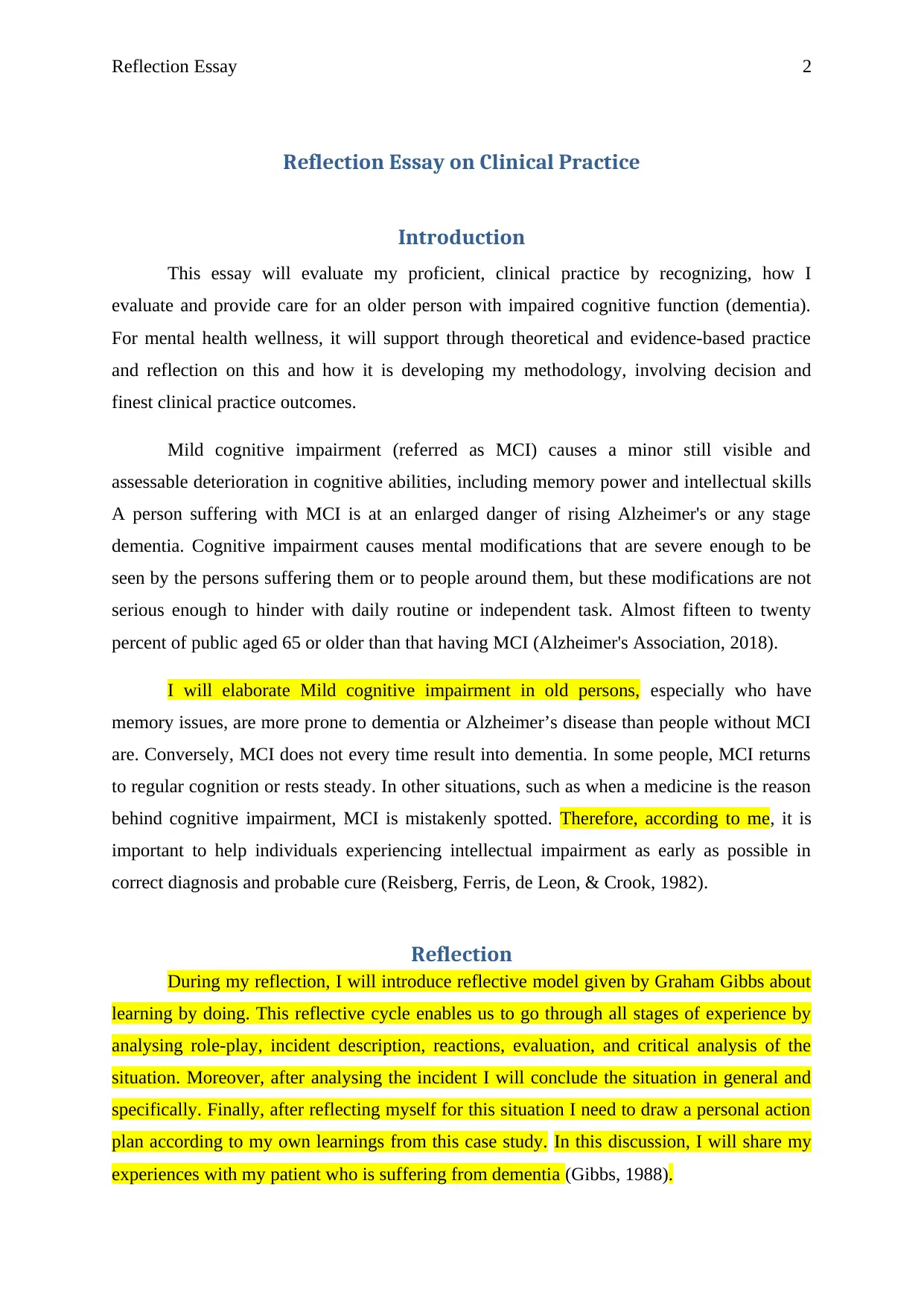
Reflection Essay 2
Reflection Essay on Clinical Practice
Introduction
This essay will evaluate my proficient, clinical practice by recognizing, how I
evaluate and provide care for an older person with impaired cognitive function (dementia).
For mental health wellness, it will support through theoretical and evidence-based practice
and reflection on this and how it is developing my methodology, involving decision and
finest clinical practice outcomes.
Mild cognitive impairment (referred as MCI) causes a minor still visible and
assessable deterioration in cognitive abilities, including memory power and intellectual skills
A person suffering with MCI is at an enlarged danger of rising Alzheimer's or any stage
dementia. Cognitive impairment causes mental modifications that are severe enough to be
seen by the persons suffering them or to people around them, but these modifications are not
serious enough to hinder with daily routine or independent task. Almost fifteen to twenty
percent of public aged 65 or older than that having MCI (Alzheimer's Association, 2018).
I will elaborate Mild cognitive impairment in old persons, especially who have
memory issues, are more prone to dementia or Alzheimer’s disease than people without MCI
are. Conversely, MCI does not every time result into dementia. In some people, MCI returns
to regular cognition or rests steady. In other situations, such as when a medicine is the reason
behind cognitive impairment, MCI is mistakenly spotted. Therefore, according to me, it is
important to help individuals experiencing intellectual impairment as early as possible in
correct diagnosis and probable cure (Reisberg, Ferris, de Leon, & Crook, 1982).
Reflection
During my reflection, I will introduce reflective model given by Graham Gibbs about
learning by doing. This reflective cycle enables us to go through all stages of experience by
analysing role-play, incident description, reactions, evaluation, and critical analysis of the
situation. Moreover, after analysing the incident I will conclude the situation in general and
specifically. Finally, after reflecting myself for this situation I need to draw a personal action
plan according to my own learnings from this case study. In this discussion, I will share my
experiences with my patient who is suffering from dementia (Gibbs, 1988).
Reflection Essay on Clinical Practice
Introduction
This essay will evaluate my proficient, clinical practice by recognizing, how I
evaluate and provide care for an older person with impaired cognitive function (dementia).
For mental health wellness, it will support through theoretical and evidence-based practice
and reflection on this and how it is developing my methodology, involving decision and
finest clinical practice outcomes.
Mild cognitive impairment (referred as MCI) causes a minor still visible and
assessable deterioration in cognitive abilities, including memory power and intellectual skills
A person suffering with MCI is at an enlarged danger of rising Alzheimer's or any stage
dementia. Cognitive impairment causes mental modifications that are severe enough to be
seen by the persons suffering them or to people around them, but these modifications are not
serious enough to hinder with daily routine or independent task. Almost fifteen to twenty
percent of public aged 65 or older than that having MCI (Alzheimer's Association, 2018).
I will elaborate Mild cognitive impairment in old persons, especially who have
memory issues, are more prone to dementia or Alzheimer’s disease than people without MCI
are. Conversely, MCI does not every time result into dementia. In some people, MCI returns
to regular cognition or rests steady. In other situations, such as when a medicine is the reason
behind cognitive impairment, MCI is mistakenly spotted. Therefore, according to me, it is
important to help individuals experiencing intellectual impairment as early as possible in
correct diagnosis and probable cure (Reisberg, Ferris, de Leon, & Crook, 1982).
Reflection
During my reflection, I will introduce reflective model given by Graham Gibbs about
learning by doing. This reflective cycle enables us to go through all stages of experience by
analysing role-play, incident description, reactions, evaluation, and critical analysis of the
situation. Moreover, after analysing the incident I will conclude the situation in general and
specifically. Finally, after reflecting myself for this situation I need to draw a personal action
plan according to my own learnings from this case study. In this discussion, I will share my
experiences with my patient who is suffering from dementia (Gibbs, 1988).
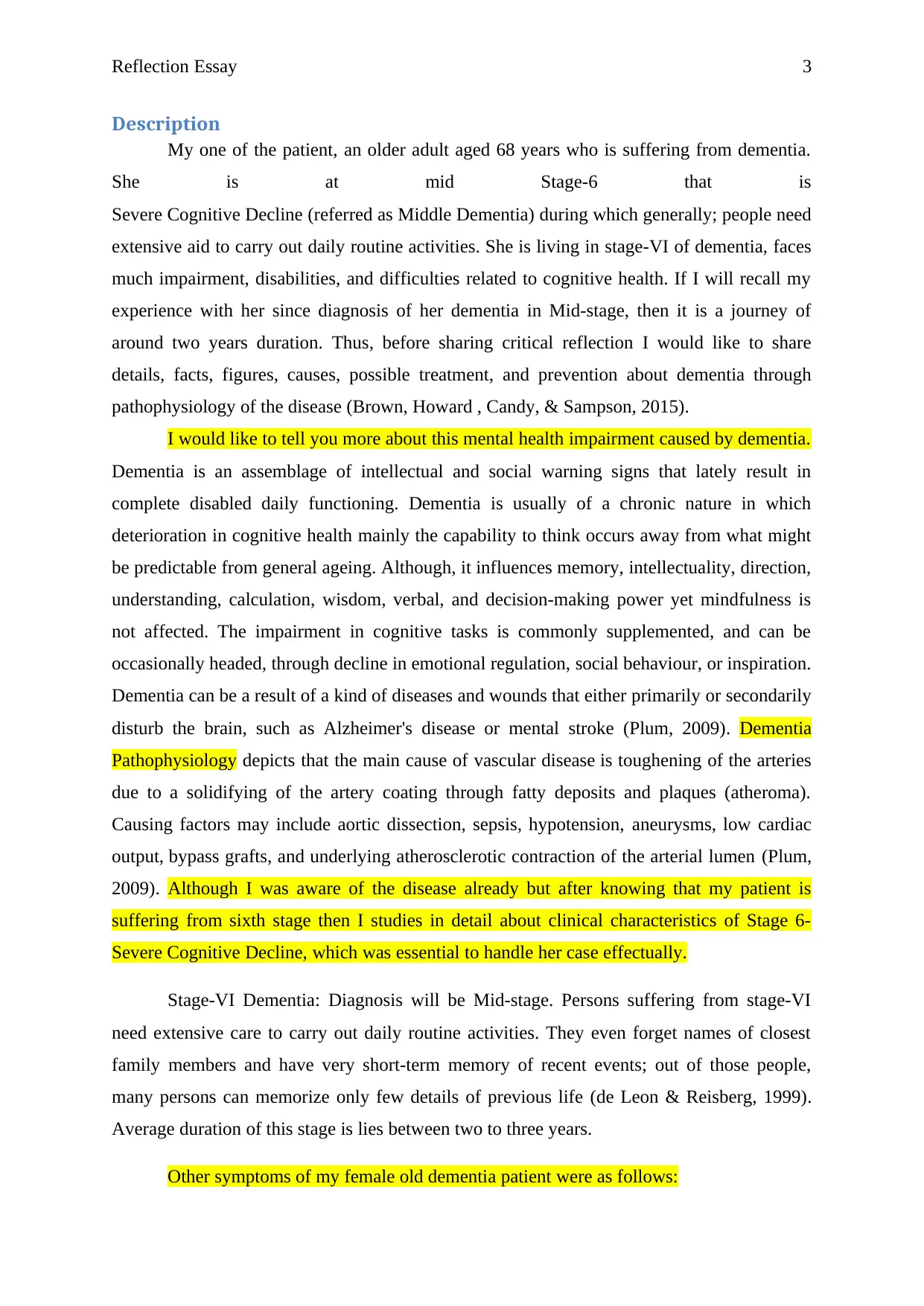
Reflection Essay 3
Description
My one of the patient, an older adult aged 68 years who is suffering from dementia.
She is at mid Stage-6 that is
Severe Cognitive Decline (referred as Middle Dementia) during which generally; people need
extensive aid to carry out daily routine activities. She is living in stage-VI of dementia, faces
much impairment, disabilities, and difficulties related to cognitive health. If I will recall my
experience with her since diagnosis of her dementia in Mid-stage, then it is a journey of
around two years duration. Thus, before sharing critical reflection I would like to share
details, facts, figures, causes, possible treatment, and prevention about dementia through
pathophysiology of the disease (Brown, Howard , Candy, & Sampson, 2015).
I would like to tell you more about this mental health impairment caused by dementia.
Dementia is an assemblage of intellectual and social warning signs that lately result in
complete disabled daily functioning. Dementia is usually of a chronic nature in which
deterioration in cognitive health mainly the capability to think occurs away from what might
be predictable from general ageing. Although, it influences memory, intellectuality, direction,
understanding, calculation, wisdom, verbal, and decision-making power yet mindfulness is
not affected. The impairment in cognitive tasks is commonly supplemented, and can be
occasionally headed, through decline in emotional regulation, social behaviour, or inspiration.
Dementia can be a result of a kind of diseases and wounds that either primarily or secondarily
disturb the brain, such as Alzheimer's disease or mental stroke (Plum, 2009). Dementia
Pathophysiology depicts that the main cause of vascular disease is toughening of the arteries
due to a solidifying of the artery coating through fatty deposits and plaques (atheroma).
Causing factors may include aortic dissection, sepsis, hypotension, aneurysms, low cardiac
output, bypass grafts, and underlying atherosclerotic contraction of the arterial lumen (Plum,
2009). Although I was aware of the disease already but after knowing that my patient is
suffering from sixth stage then I studies in detail about clinical characteristics of Stage 6-
Severe Cognitive Decline, which was essential to handle her case effectually.
Stage-VI Dementia: Diagnosis will be Mid-stage. Persons suffering from stage-VI
need extensive care to carry out daily routine activities. They even forget names of closest
family members and have very short-term memory of recent events; out of those people,
many persons can memorize only few details of previous life (de Leon & Reisberg, 1999).
Average duration of this stage is lies between two to three years.
Other symptoms of my female old dementia patient were as follows:
Description
My one of the patient, an older adult aged 68 years who is suffering from dementia.
She is at mid Stage-6 that is
Severe Cognitive Decline (referred as Middle Dementia) during which generally; people need
extensive aid to carry out daily routine activities. She is living in stage-VI of dementia, faces
much impairment, disabilities, and difficulties related to cognitive health. If I will recall my
experience with her since diagnosis of her dementia in Mid-stage, then it is a journey of
around two years duration. Thus, before sharing critical reflection I would like to share
details, facts, figures, causes, possible treatment, and prevention about dementia through
pathophysiology of the disease (Brown, Howard , Candy, & Sampson, 2015).
I would like to tell you more about this mental health impairment caused by dementia.
Dementia is an assemblage of intellectual and social warning signs that lately result in
complete disabled daily functioning. Dementia is usually of a chronic nature in which
deterioration in cognitive health mainly the capability to think occurs away from what might
be predictable from general ageing. Although, it influences memory, intellectuality, direction,
understanding, calculation, wisdom, verbal, and decision-making power yet mindfulness is
not affected. The impairment in cognitive tasks is commonly supplemented, and can be
occasionally headed, through decline in emotional regulation, social behaviour, or inspiration.
Dementia can be a result of a kind of diseases and wounds that either primarily or secondarily
disturb the brain, such as Alzheimer's disease or mental stroke (Plum, 2009). Dementia
Pathophysiology depicts that the main cause of vascular disease is toughening of the arteries
due to a solidifying of the artery coating through fatty deposits and plaques (atheroma).
Causing factors may include aortic dissection, sepsis, hypotension, aneurysms, low cardiac
output, bypass grafts, and underlying atherosclerotic contraction of the arterial lumen (Plum,
2009). Although I was aware of the disease already but after knowing that my patient is
suffering from sixth stage then I studies in detail about clinical characteristics of Stage 6-
Severe Cognitive Decline, which was essential to handle her case effectually.
Stage-VI Dementia: Diagnosis will be Mid-stage. Persons suffering from stage-VI
need extensive care to carry out daily routine activities. They even forget names of closest
family members and have very short-term memory of recent events; out of those people,
many persons can memorize only few details of previous life (de Leon & Reisberg, 1999).
Average duration of this stage is lies between two to three years.
Other symptoms of my female old dementia patient were as follows:
Secure Best Marks with AI Grader
Need help grading? Try our AI Grader for instant feedback on your assignments.
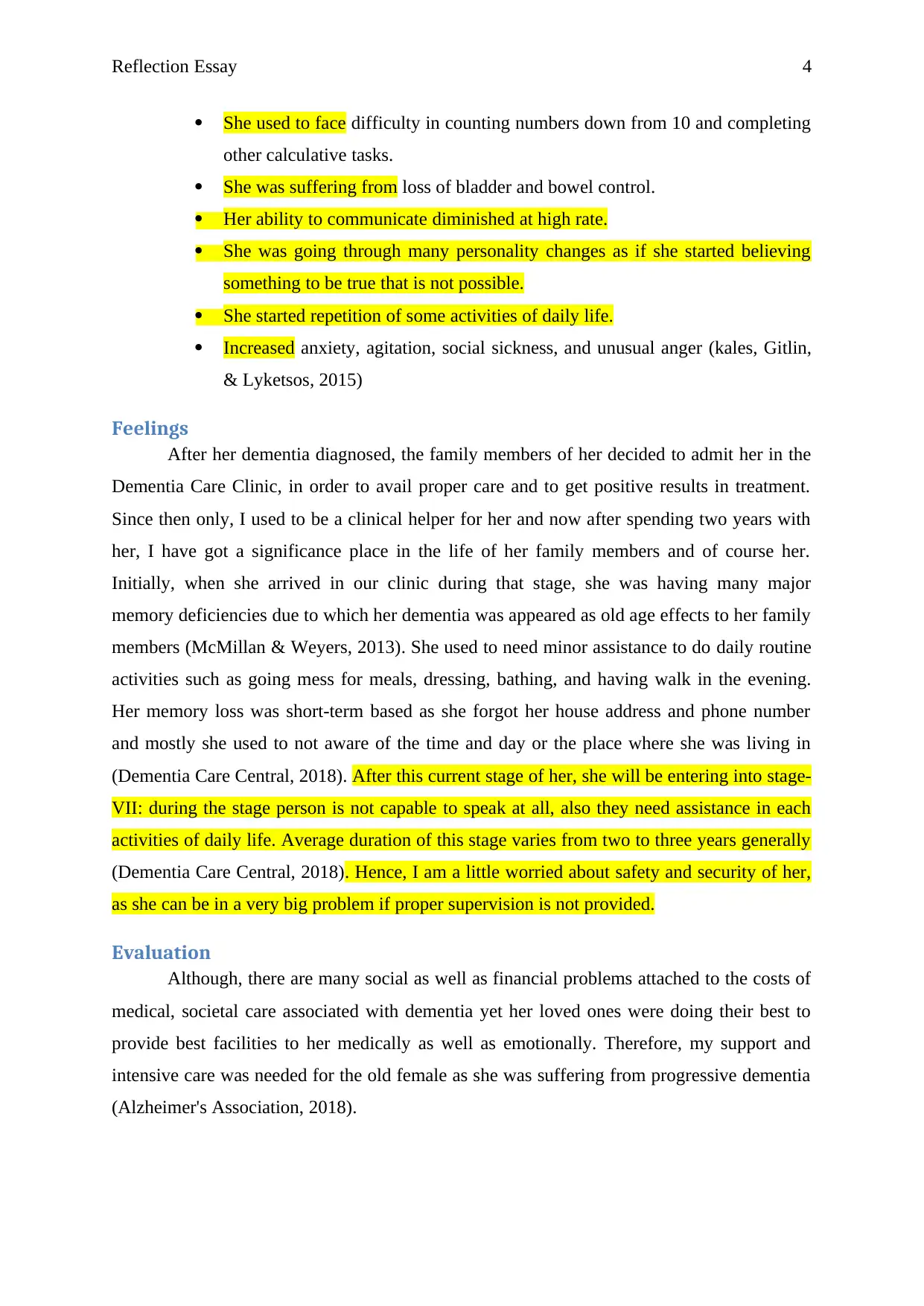
Reflection Essay 4
She used to face difficulty in counting numbers down from 10 and completing
other calculative tasks.
She was suffering from loss of bladder and bowel control.
Her ability to communicate diminished at high rate.
She was going through many personality changes as if she started believing
something to be true that is not possible.
She started repetition of some activities of daily life.
Increased anxiety, agitation, social sickness, and unusual anger (kales, Gitlin,
& Lyketsos, 2015)
Feelings
After her dementia diagnosed, the family members of her decided to admit her in the
Dementia Care Clinic, in order to avail proper care and to get positive results in treatment.
Since then only, I used to be a clinical helper for her and now after spending two years with
her, I have got a significance place in the life of her family members and of course her.
Initially, when she arrived in our clinic during that stage, she was having many major
memory deficiencies due to which her dementia was appeared as old age effects to her family
members (McMillan & Weyers, 2013). She used to need minor assistance to do daily routine
activities such as going mess for meals, dressing, bathing, and having walk in the evening.
Her memory loss was short-term based as she forgot her house address and phone number
and mostly she used to not aware of the time and day or the place where she was living in
(Dementia Care Central, 2018). After this current stage of her, she will be entering into stage-
VII: during the stage person is not capable to speak at all, also they need assistance in each
activities of daily life. Average duration of this stage varies from two to three years generally
(Dementia Care Central, 2018). Hence, I am a little worried about safety and security of her,
as she can be in a very big problem if proper supervision is not provided.
Evaluation
Although, there are many social as well as financial problems attached to the costs of
medical, societal care associated with dementia yet her loved ones were doing their best to
provide best facilities to her medically as well as emotionally. Therefore, my support and
intensive care was needed for the old female as she was suffering from progressive dementia
(Alzheimer's Association, 2018).
She used to face difficulty in counting numbers down from 10 and completing
other calculative tasks.
She was suffering from loss of bladder and bowel control.
Her ability to communicate diminished at high rate.
She was going through many personality changes as if she started believing
something to be true that is not possible.
She started repetition of some activities of daily life.
Increased anxiety, agitation, social sickness, and unusual anger (kales, Gitlin,
& Lyketsos, 2015)
Feelings
After her dementia diagnosed, the family members of her decided to admit her in the
Dementia Care Clinic, in order to avail proper care and to get positive results in treatment.
Since then only, I used to be a clinical helper for her and now after spending two years with
her, I have got a significance place in the life of her family members and of course her.
Initially, when she arrived in our clinic during that stage, she was having many major
memory deficiencies due to which her dementia was appeared as old age effects to her family
members (McMillan & Weyers, 2013). She used to need minor assistance to do daily routine
activities such as going mess for meals, dressing, bathing, and having walk in the evening.
Her memory loss was short-term based as she forgot her house address and phone number
and mostly she used to not aware of the time and day or the place where she was living in
(Dementia Care Central, 2018). After this current stage of her, she will be entering into stage-
VII: during the stage person is not capable to speak at all, also they need assistance in each
activities of daily life. Average duration of this stage varies from two to three years generally
(Dementia Care Central, 2018). Hence, I am a little worried about safety and security of her,
as she can be in a very big problem if proper supervision is not provided.
Evaluation
Although, there are many social as well as financial problems attached to the costs of
medical, societal care associated with dementia yet her loved ones were doing their best to
provide best facilities to her medically as well as emotionally. Therefore, my support and
intensive care was needed for the old female as she was suffering from progressive dementia
(Alzheimer's Association, 2018).
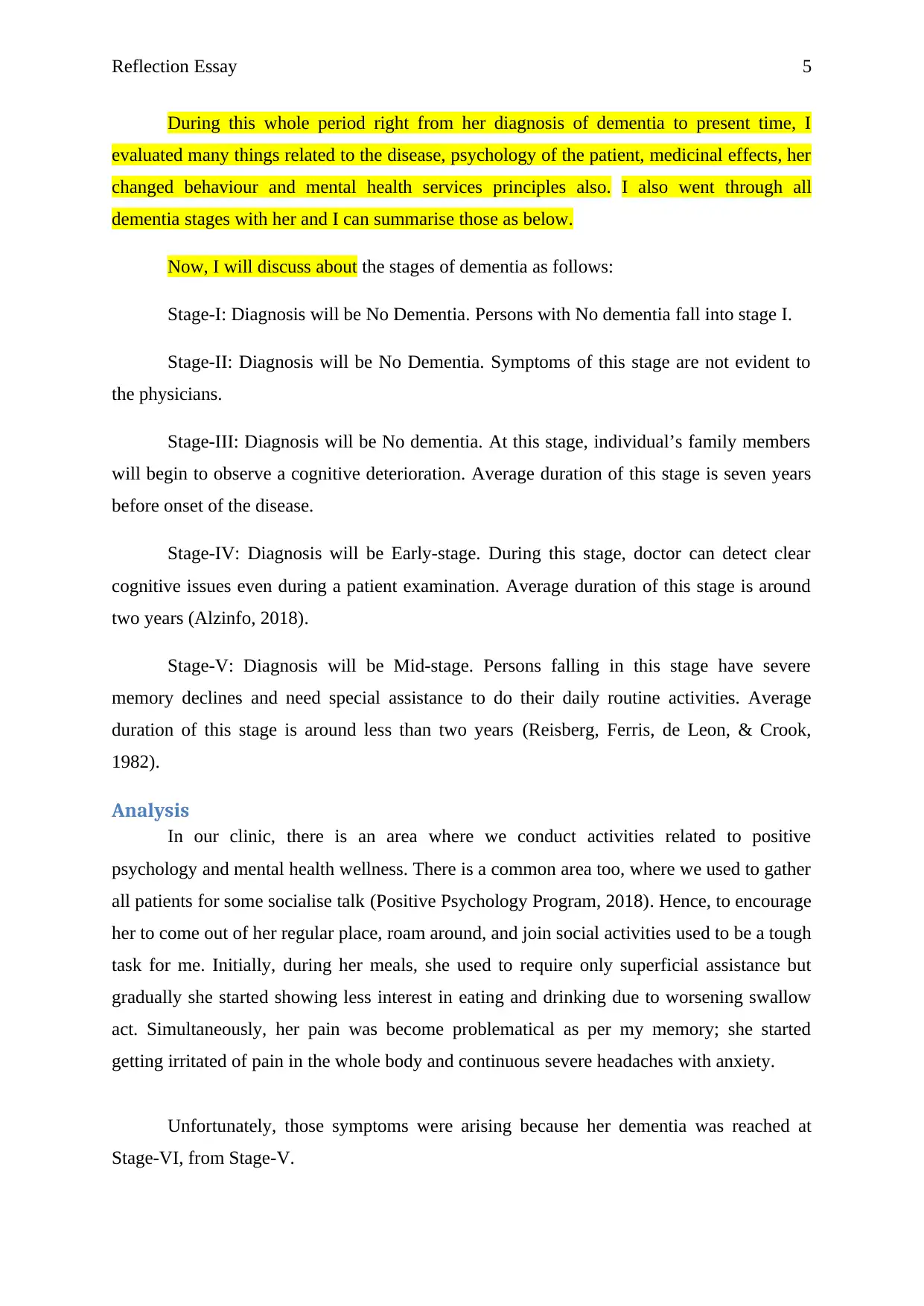
Reflection Essay 5
During this whole period right from her diagnosis of dementia to present time, I
evaluated many things related to the disease, psychology of the patient, medicinal effects, her
changed behaviour and mental health services principles also. I also went through all
dementia stages with her and I can summarise those as below.
Now, I will discuss about the stages of dementia as follows:
Stage-I: Diagnosis will be No Dementia. Persons with No dementia fall into stage I.
Stage-II: Diagnosis will be No Dementia. Symptoms of this stage are not evident to
the physicians.
Stage-III: Diagnosis will be No dementia. At this stage, individual’s family members
will begin to observe a cognitive deterioration. Average duration of this stage is seven years
before onset of the disease.
Stage-IV: Diagnosis will be Early-stage. During this stage, doctor can detect clear
cognitive issues even during a patient examination. Average duration of this stage is around
two years (Alzinfo, 2018).
Stage-V: Diagnosis will be Mid-stage. Persons falling in this stage have severe
memory declines and need special assistance to do their daily routine activities. Average
duration of this stage is around less than two years (Reisberg, Ferris, de Leon, & Crook,
1982).
Analysis
In our clinic, there is an area where we conduct activities related to positive
psychology and mental health wellness. There is a common area too, where we used to gather
all patients for some socialise talk (Positive Psychology Program, 2018). Hence, to encourage
her to come out of her regular place, roam around, and join social activities used to be a tough
task for me. Initially, during her meals, she used to require only superficial assistance but
gradually she started showing less interest in eating and drinking due to worsening swallow
act. Simultaneously, her pain was become problematical as per my memory; she started
getting irritated of pain in the whole body and continuous severe headaches with anxiety.
Unfortunately, those symptoms were arising because her dementia was reached at
Stage-VI, from Stage-V.
During this whole period right from her diagnosis of dementia to present time, I
evaluated many things related to the disease, psychology of the patient, medicinal effects, her
changed behaviour and mental health services principles also. I also went through all
dementia stages with her and I can summarise those as below.
Now, I will discuss about the stages of dementia as follows:
Stage-I: Diagnosis will be No Dementia. Persons with No dementia fall into stage I.
Stage-II: Diagnosis will be No Dementia. Symptoms of this stage are not evident to
the physicians.
Stage-III: Diagnosis will be No dementia. At this stage, individual’s family members
will begin to observe a cognitive deterioration. Average duration of this stage is seven years
before onset of the disease.
Stage-IV: Diagnosis will be Early-stage. During this stage, doctor can detect clear
cognitive issues even during a patient examination. Average duration of this stage is around
two years (Alzinfo, 2018).
Stage-V: Diagnosis will be Mid-stage. Persons falling in this stage have severe
memory declines and need special assistance to do their daily routine activities. Average
duration of this stage is around less than two years (Reisberg, Ferris, de Leon, & Crook,
1982).
Analysis
In our clinic, there is an area where we conduct activities related to positive
psychology and mental health wellness. There is a common area too, where we used to gather
all patients for some socialise talk (Positive Psychology Program, 2018). Hence, to encourage
her to come out of her regular place, roam around, and join social activities used to be a tough
task for me. Initially, during her meals, she used to require only superficial assistance but
gradually she started showing less interest in eating and drinking due to worsening swallow
act. Simultaneously, her pain was become problematical as per my memory; she started
getting irritated of pain in the whole body and continuous severe headaches with anxiety.
Unfortunately, those symptoms were arising because her dementia was reached at
Stage-VI, from Stage-V.
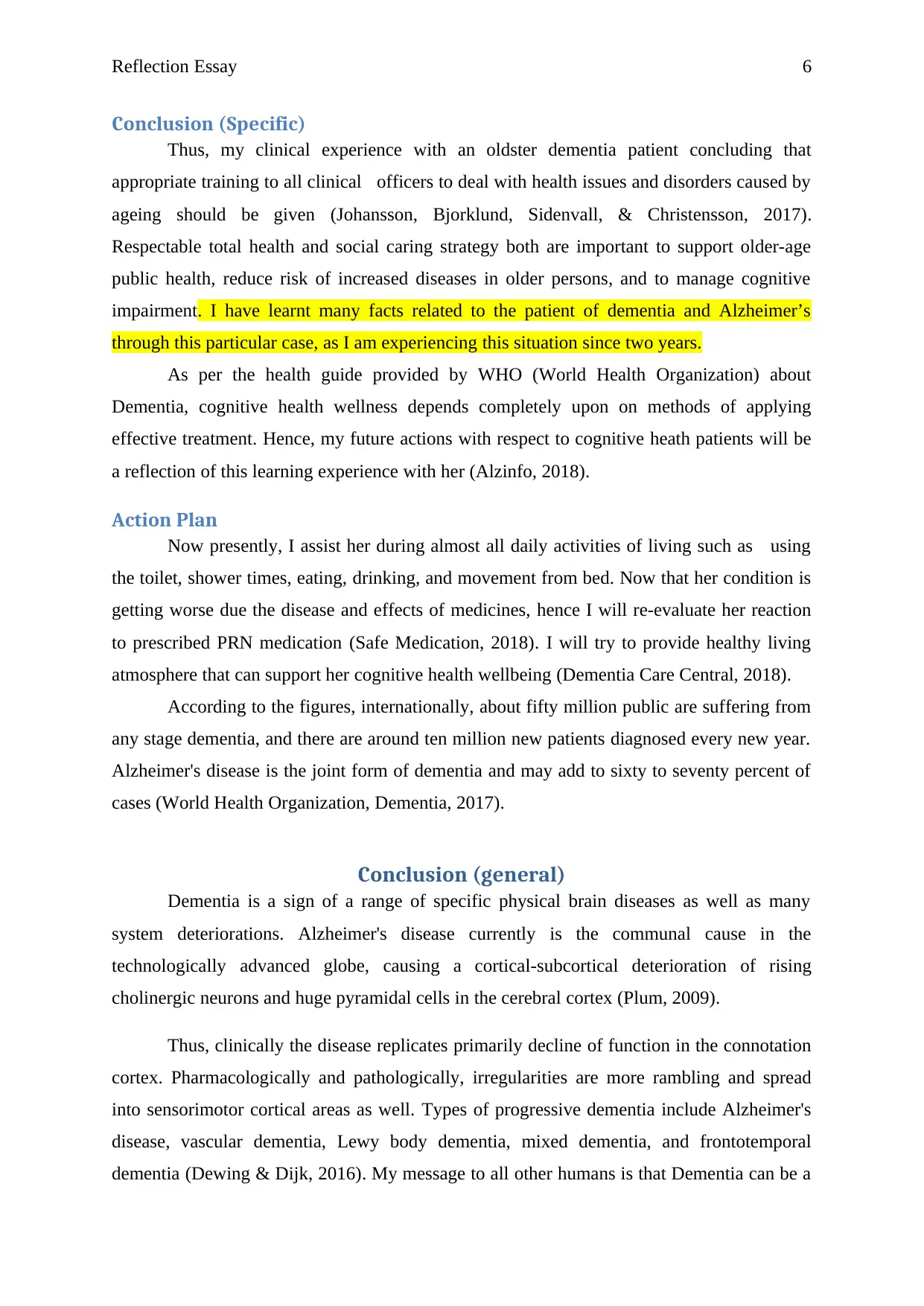
Reflection Essay 6
Conclusion (Specific)
Thus, my clinical experience with an oldster dementia patient concluding that
appropriate training to all clinical officers to deal with health issues and disorders caused by
ageing should be given (Johansson, Bjorklund, Sidenvall, & Christensson, 2017).
Respectable total health and social caring strategy both are important to support older-age
public health, reduce risk of increased diseases in older persons, and to manage cognitive
impairment. I have learnt many facts related to the patient of dementia and Alzheimer’s
through this particular case, as I am experiencing this situation since two years.
As per the health guide provided by WHO (World Health Organization) about
Dementia, cognitive health wellness depends completely upon on methods of applying
effective treatment. Hence, my future actions with respect to cognitive heath patients will be
a reflection of this learning experience with her (Alzinfo, 2018).
Action Plan
Now presently, I assist her during almost all daily activities of living such as using
the toilet, shower times, eating, drinking, and movement from bed. Now that her condition is
getting worse due the disease and effects of medicines, hence I will re-evaluate her reaction
to prescribed PRN medication (Safe Medication, 2018). I will try to provide healthy living
atmosphere that can support her cognitive health wellbeing (Dementia Care Central, 2018).
According to the figures, internationally, about fifty million public are suffering from
any stage dementia, and there are around ten million new patients diagnosed every new year.
Alzheimer's disease is the joint form of dementia and may add to sixty to seventy percent of
cases (World Health Organization, Dementia, 2017).
Conclusion (general)
Dementia is a sign of a range of specific physical brain diseases as well as many
system deteriorations. Alzheimer's disease currently is the communal cause in the
technologically advanced globe, causing a cortical-subcortical deterioration of rising
cholinergic neurons and huge pyramidal cells in the cerebral cortex (Plum, 2009).
Thus, clinically the disease replicates primarily decline of function in the connotation
cortex. Pharmacologically and pathologically, irregularities are more rambling and spread
into sensorimotor cortical areas as well. Types of progressive dementia include Alzheimer's
disease, vascular dementia, Lewy body dementia, mixed dementia, and frontotemporal
dementia (Dewing & Dijk, 2016). My message to all other humans is that Dementia can be a
Conclusion (Specific)
Thus, my clinical experience with an oldster dementia patient concluding that
appropriate training to all clinical officers to deal with health issues and disorders caused by
ageing should be given (Johansson, Bjorklund, Sidenvall, & Christensson, 2017).
Respectable total health and social caring strategy both are important to support older-age
public health, reduce risk of increased diseases in older persons, and to manage cognitive
impairment. I have learnt many facts related to the patient of dementia and Alzheimer’s
through this particular case, as I am experiencing this situation since two years.
As per the health guide provided by WHO (World Health Organization) about
Dementia, cognitive health wellness depends completely upon on methods of applying
effective treatment. Hence, my future actions with respect to cognitive heath patients will be
a reflection of this learning experience with her (Alzinfo, 2018).
Action Plan
Now presently, I assist her during almost all daily activities of living such as using
the toilet, shower times, eating, drinking, and movement from bed. Now that her condition is
getting worse due the disease and effects of medicines, hence I will re-evaluate her reaction
to prescribed PRN medication (Safe Medication, 2018). I will try to provide healthy living
atmosphere that can support her cognitive health wellbeing (Dementia Care Central, 2018).
According to the figures, internationally, about fifty million public are suffering from
any stage dementia, and there are around ten million new patients diagnosed every new year.
Alzheimer's disease is the joint form of dementia and may add to sixty to seventy percent of
cases (World Health Organization, Dementia, 2017).
Conclusion (general)
Dementia is a sign of a range of specific physical brain diseases as well as many
system deteriorations. Alzheimer's disease currently is the communal cause in the
technologically advanced globe, causing a cortical-subcortical deterioration of rising
cholinergic neurons and huge pyramidal cells in the cerebral cortex (Plum, 2009).
Thus, clinically the disease replicates primarily decline of function in the connotation
cortex. Pharmacologically and pathologically, irregularities are more rambling and spread
into sensorimotor cortical areas as well. Types of progressive dementia include Alzheimer's
disease, vascular dementia, Lewy body dementia, mixed dementia, and frontotemporal
dementia (Dewing & Dijk, 2016). My message to all other humans is that Dementia can be a
Paraphrase This Document
Need a fresh take? Get an instant paraphrase of this document with our AI Paraphraser

Reflection Essay 7
main cause of ill health and dependence among older persons so try to diagnose as early as
possible. All clinical supervisors should be kind and supportive as it is devastating not only
for the person that is suffering, but also for their families. Global efforts should be intended to
remove lack of mindfulness and understanding of dementia, succeeding in removing barriers
to diagnosis and effective care (World Health Organization, Dementia, 2017).
main cause of ill health and dependence among older persons so try to diagnose as early as
possible. All clinical supervisors should be kind and supportive as it is devastating not only
for the person that is suffering, but also for their families. Global efforts should be intended to
remove lack of mindfulness and understanding of dementia, succeeding in removing barriers
to diagnosis and effective care (World Health Organization, Dementia, 2017).

Reflection Essay 8
References
Alzheimer's Association. (2018). Together, We Can End Alzheimer's. Retrieved from
Alzheimer's Association: https://www.alz.org/alzheimers-dementia/what-is-
dementia/related_conditions/mild-cognitive-impairment
Alzinfo. (2018). CLINICAL STAGES OF ALZHEIMER’S. Retrieved from Alzinfo:
http://www.alzinfo.org/understand-alzheimers/clinical-stages-of-alzheimers/
Brown, R., Howard , R., Candy, B., & Sampson, E. (2015, 05 14). Opioids for agitation in
dementia. Retrieved 09 09, 2018, from
https://www.cochrane.org/CD009705/DEMENTIA_opioids-for-agitation-in-dementia
de Leon, M., & Reisberg, B. (1999). An Atlas of Alzheimer's Disease. Retrieved from The
Encyclopedia of Visual Medicine Series: http://www.alzinfo.org/clinical-stages-of-
alzheimers
Dementia Care Central. (2018). Seven Stages of Dementia | Symptoms & Progression.
Retrieved from DEmentia Care Central:
https://www.dementiacarecentral.com/aboutdementia/facts/stages/
Dewing, J., & Dijk, S. (2016). What is the current state of care for older people with
dementia in general hospitals? A literature review. Dementia, 15(1), 106-124.
Gibbs, G. (1988). In Learning by Doing: a guide to teaching and learning methods. Oxford:
Oxford Further Education Unit.
Johansson, L., Bjorklund, A., Sidenvall, B., & Christensson, L. (2017). Staff views on how to
improve mealtimes for elderly people with dementia living at home. Dementia, 16(7),
835-852.
kales, H., Gitlin, L., & Lyketsos, C. (2015). Assessment and management of behavioral and
psychological symptoms of dementia. bmj, 350(7), 369.
McMillan, K., & Weyers, J. (2013). In How to Imrove your Critical Thinking and Reflective
Skills. Harlow: Pearson Education Limited.
Plum, F. (2009). The Pathophysiology of dementia. Gerontology, 32(Suppl. 1), 67-72.
Positive Psychology Program. (2018). 28 Mental Health Activities, Worksheets & Books for
Adults & Students. Retrieved from https://positivepsychologyprogram.com/mental-
health-activities-worksheets-books/
Prince, M., Wu, F., Guo, Y., Robledo, L., O'Donnell, M., . . . Yusuf, S. (2015, 02). The
burden of disease in older people and implications for. The Lancet, 385(9967), 549-
References
Alzheimer's Association. (2018). Together, We Can End Alzheimer's. Retrieved from
Alzheimer's Association: https://www.alz.org/alzheimers-dementia/what-is-
dementia/related_conditions/mild-cognitive-impairment
Alzinfo. (2018). CLINICAL STAGES OF ALZHEIMER’S. Retrieved from Alzinfo:
http://www.alzinfo.org/understand-alzheimers/clinical-stages-of-alzheimers/
Brown, R., Howard , R., Candy, B., & Sampson, E. (2015, 05 14). Opioids for agitation in
dementia. Retrieved 09 09, 2018, from
https://www.cochrane.org/CD009705/DEMENTIA_opioids-for-agitation-in-dementia
de Leon, M., & Reisberg, B. (1999). An Atlas of Alzheimer's Disease. Retrieved from The
Encyclopedia of Visual Medicine Series: http://www.alzinfo.org/clinical-stages-of-
alzheimers
Dementia Care Central. (2018). Seven Stages of Dementia | Symptoms & Progression.
Retrieved from DEmentia Care Central:
https://www.dementiacarecentral.com/aboutdementia/facts/stages/
Dewing, J., & Dijk, S. (2016). What is the current state of care for older people with
dementia in general hospitals? A literature review. Dementia, 15(1), 106-124.
Gibbs, G. (1988). In Learning by Doing: a guide to teaching and learning methods. Oxford:
Oxford Further Education Unit.
Johansson, L., Bjorklund, A., Sidenvall, B., & Christensson, L. (2017). Staff views on how to
improve mealtimes for elderly people with dementia living at home. Dementia, 16(7),
835-852.
kales, H., Gitlin, L., & Lyketsos, C. (2015). Assessment and management of behavioral and
psychological symptoms of dementia. bmj, 350(7), 369.
McMillan, K., & Weyers, J. (2013). In How to Imrove your Critical Thinking and Reflective
Skills. Harlow: Pearson Education Limited.
Plum, F. (2009). The Pathophysiology of dementia. Gerontology, 32(Suppl. 1), 67-72.
Positive Psychology Program. (2018). 28 Mental Health Activities, Worksheets & Books for
Adults & Students. Retrieved from https://positivepsychologyprogram.com/mental-
health-activities-worksheets-books/
Prince, M., Wu, F., Guo, Y., Robledo, L., O'Donnell, M., . . . Yusuf, S. (2015, 02). The
burden of disease in older people and implications for. The Lancet, 385(9967), 549-
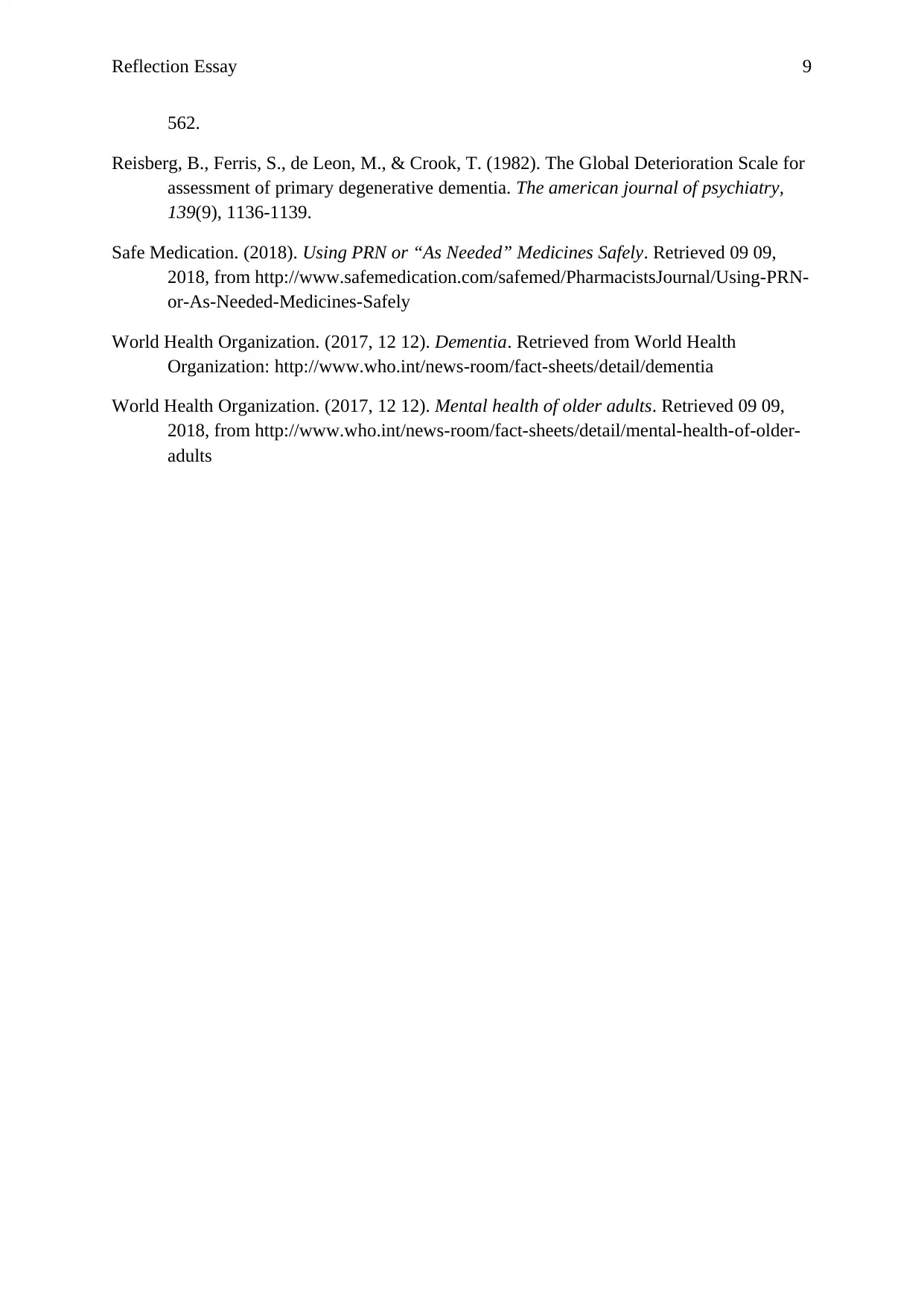
Reflection Essay 9
562.
Reisberg, B., Ferris, S., de Leon, M., & Crook, T. (1982). The Global Deterioration Scale for
assessment of primary degenerative dementia. The american journal of psychiatry,
139(9), 1136-1139.
Safe Medication. (2018). Using PRN or “As Needed” Medicines Safely. Retrieved 09 09,
2018, from http://www.safemedication.com/safemed/PharmacistsJournal/Using-PRN-
or-As-Needed-Medicines-Safely
World Health Organization. (2017, 12 12). Dementia. Retrieved from World Health
Organization: http://www.who.int/news-room/fact-sheets/detail/dementia
World Health Organization. (2017, 12 12). Mental health of older adults. Retrieved 09 09,
2018, from http://www.who.int/news-room/fact-sheets/detail/mental-health-of-older-
adults
562.
Reisberg, B., Ferris, S., de Leon, M., & Crook, T. (1982). The Global Deterioration Scale for
assessment of primary degenerative dementia. The american journal of psychiatry,
139(9), 1136-1139.
Safe Medication. (2018). Using PRN or “As Needed” Medicines Safely. Retrieved 09 09,
2018, from http://www.safemedication.com/safemed/PharmacistsJournal/Using-PRN-
or-As-Needed-Medicines-Safely
World Health Organization. (2017, 12 12). Dementia. Retrieved from World Health
Organization: http://www.who.int/news-room/fact-sheets/detail/dementia
World Health Organization. (2017, 12 12). Mental health of older adults. Retrieved 09 09,
2018, from http://www.who.int/news-room/fact-sheets/detail/mental-health-of-older-
adults
1 out of 10
Related Documents
Your All-in-One AI-Powered Toolkit for Academic Success.
+13062052269
info@desklib.com
Available 24*7 on WhatsApp / Email
![[object Object]](/_next/static/media/star-bottom.7253800d.svg)
Unlock your academic potential
© 2024 | Zucol Services PVT LTD | All rights reserved.





